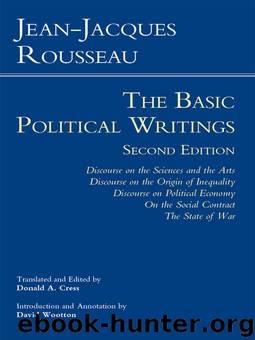Rousseau by Jean-Jacques Rousseau

Author:Jean-Jacques Rousseau
Language: eng
Format: epub
Tags: ebook, book
Publisher: Hackett Publishing Company, Inc.
Published: 2012-05-27T16:00:00+00:00
{121}
Discourse on Political
Economy
{122} Rousseau’s essay “Political Economy” was first published in the fifth volume of the Encyclopédie, which appeared in November 1755. It acquired the title by which it is generally known, Discourse on Political Economy, when it was reprinted as a pamphlet in Geneva in 1758. Rousseau himself adopted the new title in authorized editions of his works. When he composed the essay, Rousseau was writing for his still close friend Denis Diderot; the two only began to disagree in 1757. The general view is that the text was written after Rousseau’s return to Paris from Geneva in October 1754. If it fails to repeat some of the radical arguments of the second Discourse, for example in its account of the origins of property, this is presumably because Rousseau thought an encyclopedia article should be based on generally accepted assumptions. Accounts of Rousseau’s political theory often fail to take account of the terms in which Rousseau presents amour propre and the general will in this essay, which is crucial for an understanding of the development of his political theory.
D.W.
{123} DISCOURSE ON POLITICAL ECONOMY1
ECONOMY or OECONOMY (Morals and Politics).2 This word is derived from , house, and , law, and originally signified merely the wise and legitimate government of the household for the common good of the entire family. The meaning of this term was later extended to the government of the large family, that is, the state. To distinguish these two usages, in the latter case it is called general or political economy, and in the former case it is called domestic or private economy. Only the first of these is the subject of this article. Regarding domestic economy, see FATHER OF THE FAMILY.
Even if there were as much similarity between the state and the family as many authors would have us believe, it would not follow as a consequence that the rules of conduct proper to one of these societies would be suitable to the other. They differ too much in size to be capable of being administered in the same fashion. Moreover, there will always be an extreme difference between domestic government, where the father can see everything for himself, and civil government, where the leader sees hardly anything unless through someone else’s eyes. For things to become equal in this regard, the talents, force, and all the faculties of the father would have to increase in proportion to the size of his family, and the soul of a powerful monarch would have to be, in comparison with that of an ordinary man, what the size of his empire is to that of the private individual’s patrimony.
But how could the government of the state be similar to that of the family, whose basis is so different? With the father being physically stronger than his children, paternal power is reasonably said to be established by nature for as long as his help is needed by them. In the large family, all of whose members are naturally equal, political
Download
This site does not store any files on its server. We only index and link to content provided by other sites. Please contact the content providers to delete copyright contents if any and email us, we'll remove relevant links or contents immediately.
The remains of the day by Kazuo Ishiguro(7543)
Tools of Titans by Timothy Ferriss(6938)
The Black Swan by Nassim Nicholas Taleb(6184)
Inner Engineering: A Yogi's Guide to Joy by Sadhguru(5888)
Giovanni's Room by James Baldwin(5873)
The Way of Zen by Alan W. Watts(5790)
The Six Wives Of Henry VIII (WOMEN IN HISTORY) by Fraser Antonia(4785)
The Power of Now: A Guide to Spiritual Enlightenment by Eckhart Tolle(4749)
Astrophysics for People in a Hurry by Neil DeGrasse Tyson(4614)
Asking the Right Questions: A Guide to Critical Thinking by M. Neil Browne & Stuart M. Keeley(4567)
12 Rules for Life by Jordan B. Peterson(3724)
The Ethical Slut by Janet W. Hardy(3494)
Skin in the Game by Nassim Nicholas Taleb(3456)
Housekeeping by Marilynne Robinson(3397)
The Art of Happiness by The Dalai Lama(3378)
Double Down (Diary of a Wimpy Kid Book 11) by Jeff Kinney(3267)
Skin in the Game: Hidden Asymmetries in Daily Life by Nassim Nicholas Taleb(3259)
Walking by Henry David Thoreau(3228)
12 Rules for Life: An Antidote to Chaos by Jordan B. Peterson(3196)
